 W
WAndricus aries is a species of gall-forming wasps, in the genus Andricus. The species was named by the French entomologist Joseph-Étienne Giraud, in 1859. It is commonly found in eastern Europe and during the 21st century has spread to western Europe.
 W
WAndricus grossulariae is a gall wasp species inducing agamic acorn cup galls on oak tree acorn cups and sexual phase galls on catkins. Synonyms include Andricus fructuum, Andricus gemellus, Andricus intermedius, Andricus mayri and Cynips panteli.
 W
WAphylla protracta, the narrow-striped forceptail, is a species of clubtail in the family of dragonflies known as Gomphidae. It is found in Central America and North America.
 W
WArctopsyche ladogensis is a species of netspinning caddisfly in the family Hydropsychidae. It is found in Europe & Northern Asia.
 W
WBlepharomyia piliceps is a species of fly in the family Tachinidae.
 W
WBombus confusus is a species of bumblebee found in Austria, Belgium, the Czech Republic, France, Germany, Hungary, Lithuania, Poland, Romania, Slovakia, Slovenia, Spain, and Switzerland.
 W
WBurtinus notatipennis is a species of broad-headed bug in the family Alydidae. It is found in Central America, North America, and South America.
 W
WCatorhintha selector is a species of leaf-footed bug in the family Coreidae. It is found in the Caribbean Sea, Central America, North America, and South America.
 W
WCoelichneumon cyaniventris is a species of wasp belonging to the family Ichneumonidae. The species was first described by Constantin Wesmael in 1859.
 W
WCreontiades dilutus is commonly known as the green mirid, it is a member of the bug family Miridae. This insect is considered a "generalist" feeding on over 100 plant species, and is also a major economic pest on several important agricultural crops.
 W
WDolerus nitens is a Palearctic species of sawfly.
 W
WEpiphragma solatrix is a species of limoniid crane fly in the family Limoniidae.
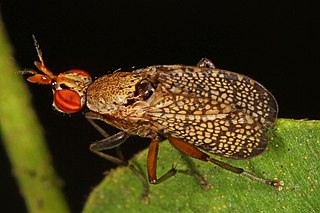 W
WEuthycera arcuata is a species of marsh fly in the family Sciomyzidae.
 W
WFitchia aptera is a species of assassin bug in the family Reduviidae. It is found in North America.
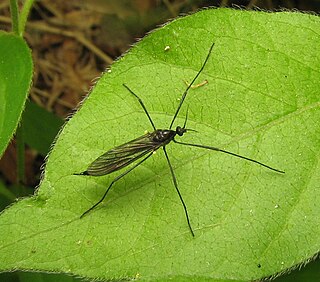 W
WGnophomyia tristissima is a species of limoniid crane flies in the family Limoniidae. It is all black with yellow halteres.
 W
WHypoponera punctatissima, or Roger's ant, is a species of ant in the family Formicidae.
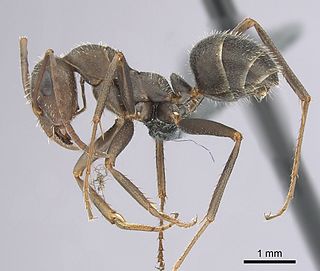 W
WIberoformica subrufa is a species of ant that is one of the two species in the genus Iberoformica. Described in 1859 by Roger, the species is mainly distributed to mainland Europe.
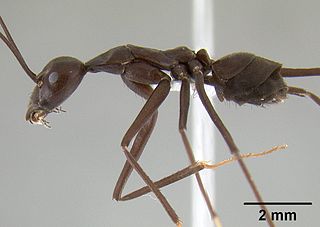 W
WLeptomyrmex flavitarsus is a species of ant in the genus Leptomyrmex. Described by Smith in 1859, the species is endemic to Indonesia and New Guinea.
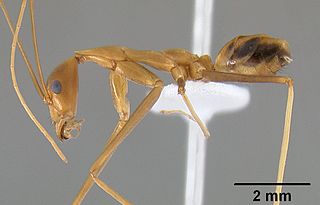 W
WLeptomyrmex fragilis is a species of ant in the genus Leptomyrmex. Described by Smith in 1859, the species is endemic to Indonesia and New Guinea and the Philippines.
 W
WLimnogonus franciscanus is a species of water strider in the family Gerridae. It is found in the Caribbean Sea, Central America, North America, and South America.
 W
WLimonia communis is a species of limoniid crane fly in the family Limoniidae.
 W
WMicrocentrum rhombifolium is a species in the family Tettigoniidae ("katydids"), in the order Orthoptera. Common names are "greater angle-wing katydid" and "broad-winged katydid". Microcentrum rhombifolium is found in North America.
 W
WNeodiprion lecontei is a species of sawfly in the family Diprionidae native to eastern North America, commonly known as the red-headed pine sawfly or leconte's sawfly. The larvae feed on the foliage of many species of native and imported pines. This species was named after John Lawrence LeConte, an American entomologist of the 19th century.
 W
WPentalonia nigronervosa is an aphid in the superfamily Aphidoidea in the order Hemiptera. It is a true bug and sucks sap mainly from Musa species.
 W
WPhilidris cordata is a species of ant in the genus Philidris. Described by Smith in 1859, the species is endemic to Indonesia and New Guinea. This species is a frequent inhabitant of the ant plant genera: Myrmecodia and Hydnophytum.
 W
WThe Hausleithner's Stick Insect,, is a species of phasmid or leaf insect of the genus Phyllium. It is found in peninsular Malaysia, and Sri Lanka.
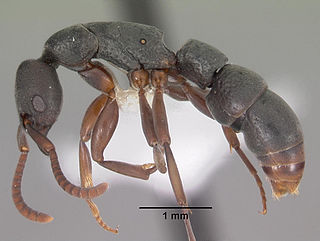 W
WPlatythyrea parallela, is a species of ant of the subfamily Ponerinae. It is a cosmopolitan species.
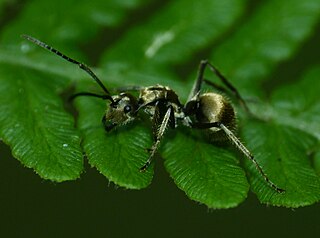 W
WPolyrhachis illaudata is a species of large ant found in Sri Lanka, India extending through Southeast Asia to the Philippines. The colonies have a single queen and nest within wood.
 W
WPristiphora staudingeri is a Holarctic species of sawfly.
 W
WRhodnius prolixus is the principal triatomine vector of the Chagas parasite due to both its sylvatic and domestic populations in northern South America as well as to its exclusively domestic populations in Central America. It has a wide range of ecotopes, mainly savanna and foothills with an altitude of between 500 meters to 1,500 meters above sea level and temperatures of 16 °C to 28 °C. Sylvatic R. prolixus, as virtually all Rhodnius spp., is primarily associated with palm tree habitats and has a wide range of hosts including birds, rodents, marsupials, sloths, and reptiles.
 W
WThe Saharan silver ant is a species of insect that lives in the Sahara Desert. It is the fastest of the world’s 12,000 known ant species, clocking a blistering velocity of 855 millimetres per second. It can travel a length 108 times its own body length per second, a feat topped only by two other creatures, the Australian tiger beetle Cicindela eburneola and the California coastal mite Paratarsotomus macropalpis. This is nearly the walking pace of a human being, and compared to its body size would correspond to a speed of about 200 m/s (720 km/h) for a 180 cm (6 ft) tall human runner.
 W
WThe Pink Winged Stick Insect, also called Madagascan Stick Insect, is a species of phasmid or stick insect of the genus Sipyloidea. It is the most widespread phasmid in the world, can be found throughout tropical Asia and parts of Southeast Asia.
 W
WThasus acutangulus is an insect of the order Hemiptera, or the "true bugs". As a member of the family Coreidae, it is a leaf-footed bug. It was described by the Swedish entomologist Carl Stål in 1859.
 W
WThyanta pallidovirens, the red-shouldered stink bug, is a species of stink bug in the family Pentatomidae. It is found in Central America and North America.
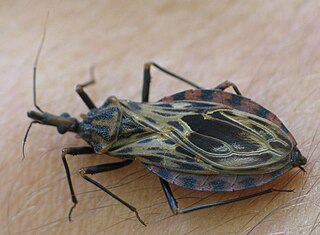 W
WTriatoma nigromaculata is a sylvatic species of insect usually found in hollow trees, in vertebrate nests on trees and occasionally in human dwellings. It usually lives in relatively humid forests at high altitudes on mountain regions and foot hills. As all members of the subfamily Triatominae, T. nigromaculata is a blood-sucking bug and a potential vector of Chagas disease. This species is distributed mainly in Venezuela, but some specimens have also been found in Perú and Colombia (Cauca).
 W
WTupiocoris californicus is a species of plant bug in the family Miridae.